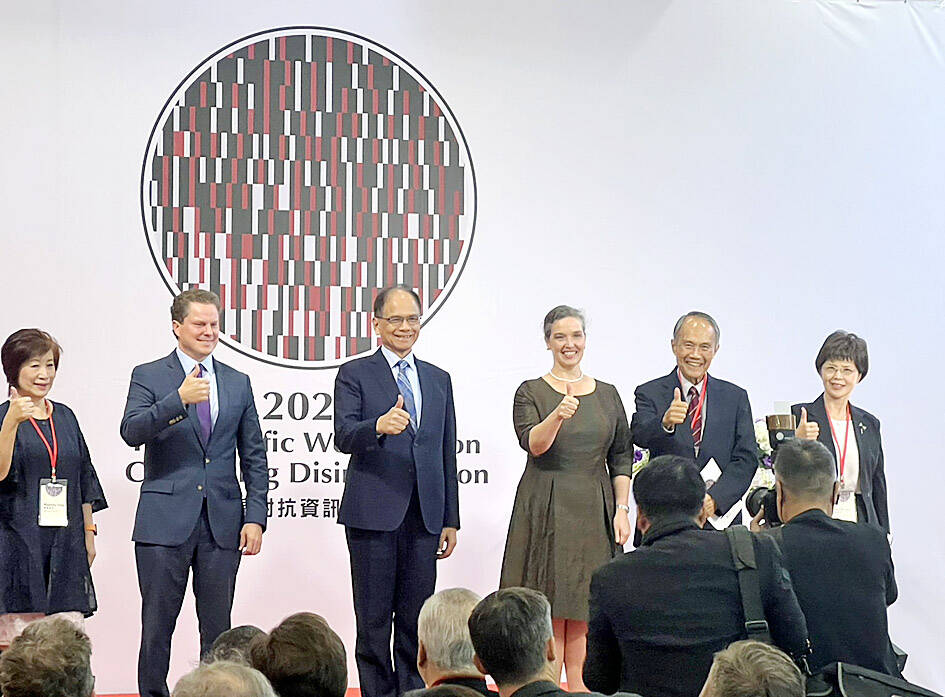The US and Taiwan stand together on the front lines of the fight against disinformation and have both faced harmful misinformation in their democratic elections, the US’ top envoy to Taipei said yesterday.
Speaking at the opening ceremony of the Indo-Pacific Workshop on Countering Disinformation, American Institute in Taiwan (AIT) Director Sandra Oudkirk praised Taiwan for its respect for “fundamental freedoms” and its strong commitment to the “free exchange of ideas.”
“At a time of democratic backsliding and human rights abuses elsewhere in the Indo-Pacific, Taiwan serves as an invaluable model to others,” Oudkirk said.

Photo: CNA
However, in the Internet age and with the emergence of artificial intelligence, the spread of disinformation to open democratic societies is becoming more challenging to combat, she said.
The “United States, Taiwan and many others are on the front lines as we grapple with the spread of disinformation and propaganda, particularly as foreign actors seek to use social media and emerging technologies to manipulate public discourse ... and undermine confidence in our democratic institutions,” she said.
Amid this threat, such a forum is important for sharing experiences and best practices with like-minded representatives of governments, civil society and academia from around the world, she said.
“We believe a well-informed citizenry is key to the strength of democratic institutions, healthy and robust public debate, based on facts, evidence and research, are integral to effective civic engagement,” Oudkirk said.
David Shullman, senior director of the Global China Hub at the US-based think tank the Atlantic Council, also spoke at the forum, warning of China’s disinformation campaign targeting Taiwan.
Beijing’s Taiwan-focused disinformation efforts used to be “primarily focused on promoting a positive narrative, making the argument that unification will restore cultural ties and bring economic benefits to Taiwan,” Shullman said.
However, as support for the “one country, two systems” model has faded in Taiwan, Chinese disinformation is now primarily directed at undermining trust in democracy and Taiwan’s government, he said.
With Taiwan’s rich experience in combating Chinese disinformation, it has also become an expert in this area, he said.
“Taiwan has combined high-tech efforts with more analogue solutions, like improving government communication, crowdsourcing and maintaining tools for fact-checking and countering conspiracies and propaganda, and expanding the media literacy of education,” he said.
The two-day workshop is organized by the Taiwan Foundation for Democracy, a government-funded non-governmental organization.

‘DENIAL DEFENSE’: The US would increase its military presence with uncrewed ships, and submarines, while boosting defense in the Indo-Pacific, a Pete Hegseth memo said The US is reorienting its military strategy to focus primarily on deterring a potential Chinese invasion of Taiwan, a memo signed by US Secretary of Defense Pete Hegseth showed. The memo also called on Taiwan to increase its defense spending. The document, known as the “Interim National Defense Strategic Guidance,” was distributed this month and detailed the national defense plans of US President Donald Trump’s administration, an article in the Washington Post said on Saturday. It outlines how the US can prepare for a potential war with China and defend itself from threats in the “near abroad,” including Greenland and the Panama

A magnitude 4.9 earthquake struck off Tainan at 11:47am today, the Central Weather Administration (CWA) said. The hypocenter was 32.3km northeast of Tainan City Hall at a depth of 7.3km, CWA data showed. The intensity of the quake, which gauges the actual effect of a seismic event, measured 4 in Tainan and Chiayi County on Taiwan's seven-tier intensity scale, the data showed. The quake had an intensity of 3 in Chiayi City and County, and Yunlin County, while it was measured as 2 in Kaohsiung, Nantou County, Changhua County, Taitung County and offshore Penghu County, the data showed. There were no immediate reports of

The Chinese Nationalist Party (KMT) is maintaining close ties with Beijing, the Democratic Progressive Party (DPP) said yesterday, hours after a new round of Chinese military drills in the Taiwan Strait began. Political parties in a democracy have a responsibility to be loyal to the nation and defend its sovereignty, DPP spokesman Justin Wu (吳崢) told a news conference in Taipei. His comments came hours after Beijing announced via Chinese state media that the Chinese People’s Liberation Army’s Eastern Theater Command was holding large-scale drills simulating a multi-pronged attack on Taiwan. Contrary to the KMT’s claims that it is staunchly anti-communist, KMT Deputy

RESPONSE: The government would investigate incidents of Taiwanese entertainers in China promoting CCP propaganda online in contravention of the law, the source said Taiwanese entertainers living in China who are found to have contravened cross-strait regulations or collaborated with the Chinese Communist Party (CCP) could be subject to fines, a source said on Sunday. Several Taiwanese entertainers have posted on the social media platform Sina Weibo saying that Taiwan “must be returned” to China, and sharing news articles from Chinese state media. In response, the Mainland Affairs Council (MAC) has asked the Ministry of Culture to investigate whether the entertainers had contravened any laws, and asked for them to be questioned upon their return to Taiwan, an official familiar with the matter said. To curb repeated